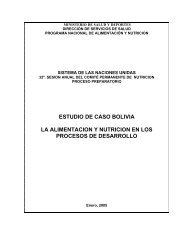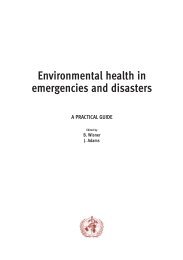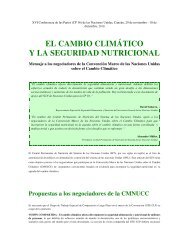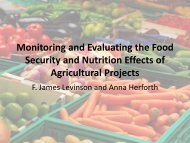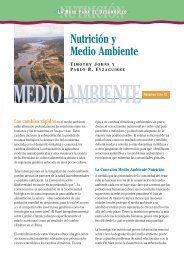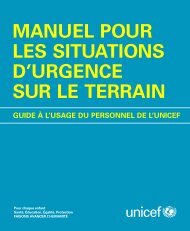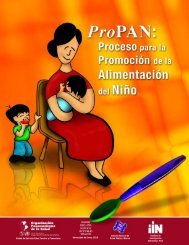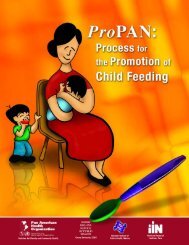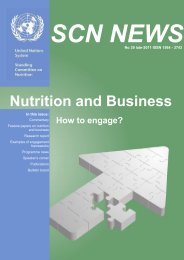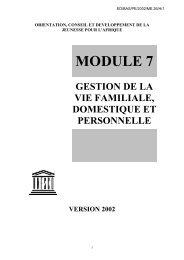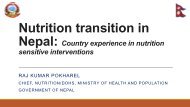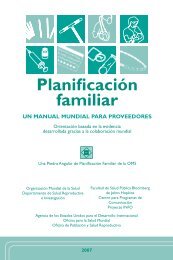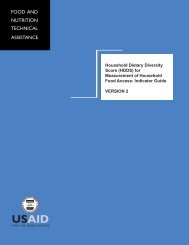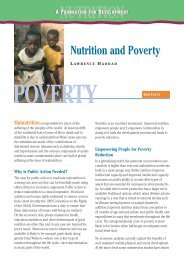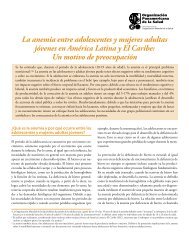SCN News No 36 - UNSCN
SCN News No 36 - UNSCN
SCN News No 36 - UNSCN
Create successful ePaper yourself
Turn your PDF publications into a flip-book with our unique Google optimized e-Paper software.
www.unsystem.org/scn 51<br />
35 th <strong>SCN</strong> Session Recommendations<br />
The participants at the 35th <strong>SCN</strong> Session, in the Working Groups and Constituency meetings, discussed a set of recommendations<br />
that was later agreed by email and in the <strong>SCN</strong> Steering Committee. We have reprinted here the one-page<br />
Executive Summary, the full set of recommendations, as well as detailed notes with programme and policy guidance.<br />
UNITED NATIONS SYSTEM<br />
Standing Committee on Nutrition<br />
RECOMMENDATIONS FROM THE <strong>SCN</strong> 35 TH SESSION<br />
"ACCELERATING THE REDUCTION OF MATERNAL AND CHILD UNDERNUTRITION"<br />
EXECUTIVE SUMMARY<br />
The 35 th Session of the <strong>SCN</strong> held in Hanoi in March 2008, which focussed on accelerating the reduction of maternal and<br />
child undernutrition, made the following recommendations:<br />
Recognizing that:<br />
• The global burden of maternal and child undernutrition remains unconscionably large, and is the single greatest constraint<br />
facing global development efforts.<br />
• A renewed and strengthened evidence base exists for a set of essential nutrition interventions that if effectively targeted<br />
to mothers and children from conception to two years of age, could prevent at least a quarter of child deaths under <strong>36</strong><br />
months of age, and reduce the prevalence of stunting by about a third.<br />
• Although this important set of interventions cannot replace socio-economic development, they can help accelerate the<br />
reduction of maternal and child undernutrition, especially when main-streamed into efforts to tackle poverty, improve<br />
food security and livelihood support, and strengthen health service delivery.<br />
• Remarkably little is being done to tackle the problem of maternal and child undernutrition, especially in the countries<br />
most affected. Increased mobilization is therefore needed at all levels of society in order to act at scale with this set of<br />
essential nutrition interventions.<br />
• The recent increases in food prices and the reduction of grain stocks to a 30 year low threaten the capacity to provided<br />
assistance and ensure the right to food, especially in those nations showing least progress towards achieving the nonincome<br />
targets of MDG1.<br />
• Global nutrition leadership needs to be further strengthened in order to facilitate technical and policy consensus that<br />
will permit accelerated reduction of maternal and child undernutrition.<br />
Recommends that:<br />
• Governments give greater recognition to the importance of maternal and child undernutrition and their contribution to<br />
development, as well as their legal obligation under international human rights law, and provide leadership in ensuring that<br />
the appropriate policies and programmes are put in place, so that the essential nutrition interventions are implemented at<br />
scale, and the most vulnerable households are protected in the face of unexpected economic and/or environmental shocks.<br />
• Donors, foundations and other funding sources, while aligning and adapting global initiatives to national priorities, as<br />
part of their assistance to those countries most affected by maternal and child undernutrition, give a far greater priority<br />
to funding and facilitating at scale coverage of the essential nutrition actions as an integral part of poverty reduction and<br />
health system strengthening.<br />
• The UN system through its country teams give greater priority in its development assistance to maternal and child undernutrition,<br />
supporting Member States actions to ensure the essential set of nutrition interventions at scale as part of the poverty<br />
reduction activities, as well as realizing human rights relevant to nutrition, including the right to adequate food and to health.<br />
• The UN take the lead in developing extraordinary measures to counteract escalating food prices, and ensure the capacity<br />
to respect, protect and fulfil the right to food, especially of the most vulnerable, in the event of natural disasters and other<br />
emergencies.<br />
• All actors give greater attention to monitoring and evaluating programmes aimed at accelerating the reduction of maternal<br />
and child undernutrition. Policies at global, regional and country level be reviewed, harmonized and monitored, with<br />
a view to encourage integrated support to at risk families, and to promote and protect maternal and child nutrition. Furthermore<br />
progress towards the achievement of MDG 1 should be reported against reductions in the prevalence of<br />
stunting in children below the age of five, not just underweight.<br />
• The upcoming reviews of the <strong>SCN</strong> and the global nutrition architecture, which are welcomed, should examine the different<br />
structures and alternative approaches being used by other sectors.



